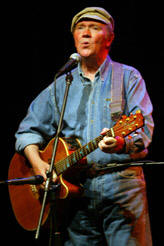Liam Clancy
Mullingar Arts Centre, 9 April 2005
 Review
Snapshot:
Review
Snapshot:
A sometimes raucous, sometimes melancholy, evening in the company of
a master of the Irish ballad tradition. As demonstrated this evening, his
version of the 'The Parting Glass' should be required listening for anyone who
loves Irish folk music.
The CLUAS Verdict?
8 out of 10
Full review:
There's probably a stage at which most performers, by virtue of
sheer experience and longevity, shift from being a performer to a legend.
69 years old, with half a century of singing and acting behind him, it's fair to
say that Liam Clancy has paid his dues.
Tonight his performance to a packed Mullingar Arts Centre leaves one in little
doubt as to his continued enthusiasm for the stage, after 50 years of
performances.
The audience are treated, in true troubadour style, to a performance that ranges
from recitations of Yeats' poetry, through Newfoundland whaling shanties, to
spoken word elegies and, of course, the balladry he, his late brothers, and
Tommy Makem made famous in the early 60s.
And stories too. Clancy is nothing if not a talker, and his yarns are worth the
admission alone.
There are few performers who can recount the tale of a fresh-faced Bob Dylan
eagerly stopping them in the street to play them a new song he wrote ("I took
the tune from The Patriot Game," the young folksinger gushed).
Or, half naked, sharing a flea-ridden room in a Kilkenny 'louse house' with 12
snoring, drunk labourer 'monsters'.
Or, more pleasantly, a jug of hot whiskey with Ewan MacColl. Or swapping
addresses with Johnny Cash and Willie Nelson prior to a show at Madison Square
Garden ("'Johnny Cash, Cash House, Hendersonville, Tennessee' - he said.
'Liam Clancy, Ring, Waterford' - I told him").
The songs that follow, peppering the stories, range from 1950s folk standards (MacColl's
'Freeborn Man of the Travelling People') to the old ballad staples (don't forget - this guy was singing 'The Irish Rover' while the Dubliners were still sober
teenagers).
While the material is mostly sweet or humorous, at times the show is infused
with a heartbreaking melancholy, a very real sense of sadness on the part of
Clancy, who now clearly sees himself, in terms of his generation, as a last man
standing.
It comes by way of a spoken elegy to late Dubliner Luke Kelly. Whilst recounting
his memory of 'Lukie', Clancy also recalls "my own brothers Paddy, Tom and
Bobby", and conjures up memories of old, black and white nights of singing,
acting and carousing.
These are the ghosts that linger behind Liam Clancy, and suddenly the stage
seemed very lonely.
But a raucous (is there any other?) 'Wild Rover' lifts matters to the close,
before Clancy returns, with a lone concertina accompaniment, for a beautiful
rendition of 'The Parting Glass'.
Often hackneyed and poorly-served by lesser singers over the years (including
Dylan's noted reworking 'Restless Farewell') this was a song finally brought
home.
It was impossible not to be moved as a 70 year, yet ageless tenor caressed the
last lines:
"All the comrades that e'er I had, they're sorry for my
going away,
And all the sweethearts that e'er I had, they'd wish me one day to stay,
But since it falls unto my lot that I should rise and you should not,
I'll gently rise and softly call, good night and joy be with you all."
To echo Mr Dylan's own words - Liam Clancy is the best ballad singer I have
ever heard.
Cormac Looney![]() Feel
free to discuss this review on the CLUAS
Discussion Board.
Feel
free to discuss this review on the CLUAS
Discussion Board.![]() Check out our other articles on theIrish Folk Music Scene.
Check out our other articles on theIrish Folk Music Scene.
